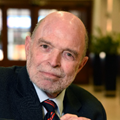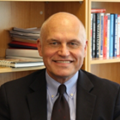


![]() JOIN THE CONVERSATION: #NEWECON #SOCIALPROTECTION
JOIN THE CONVERSATION: #NEWECON #SOCIALPROTECTION
Rapid technological change promises higher economic growth, but it also presents many challenges. As new jobs are created, others are lost, and the burden of adjustment can be heavy for some. At the same time, the benefits of growth might not be equally shared, with capital owners and the higher skilled benefiting more than others. Technological change, in combination with increased globalization of product and factor markets and liberalization of labor markets, often comes with increasing employment and income uncertainty throughout many peoples’ lives. Working lives will involve more frequent transitions across jobs and job statuses. Are today’s social protection systems up to the challenge? Do these developments require rethinking how society deals with increasing risk? What is the role of enhancing human capital to address inequality of opportunity? What is the role of redistributive taxes and transfers? Or is a bigger rethinking of public policy needed, rather than just doing the old things better?
Moderator: David Lipton, First Deputy Managing Director, IMF
Panelists:
Nicholas Barr, Professor of Public Economics, London School of Economics
Sharan Burrow, General Secretary, International Trade Union Confederation
Nora Lustig, Samuel Z. Stone Professor of Latin American Economics and Director of the Commitment to Equity Institute (CEQ), Tulane University
Michal Rutkowski, Senior Director for Social Protection and Jobs, World Bank Group
Rapid technological change promises higher economic growth, but it also presents many challenges. As new jobs are created, others are lost, and the burden of adjustment can be heavy for some. At the same time, the benefits of growth might not be equally shared, with capital owners and the higher skilled benefiting more than others. Technological change, in combination with increased globalization of product and factor markets and liberalization of labor markets, often comes with increasing employment and income uncertainty. Working lives will involve more frequent transitions across jobs and job statuses.
Key Points:
· Social protection design. For advanced countries, Barr highlighted the skills-mismatch problem and argued that policy design should shift away from employment-based entitlement and that skills training should be intensified. Rutkowski stressed that employment in developing economies is still 90 percent informal, and argued that we should stop linking social protection programs to formal employment. He noted that flexible labor markets do not have to be the enemy of social protection, but that they should promote innovation over simply automation.
· Responsibility and funding. Burrow said too many corporations and governments evade the responsibility of social protection. A social protection system costs less than 6 percent of GDP, but sometimes it takes development aid to kickstart it. The future of social protection could be based on a universal basic income (UBI). Lustig argued there should be a commitment to equity and that everyone should have access. But there is a question of funding social safety nets and income floors in developing economies. If the system is based on consumption taxes, the poor may end up being net payers. Such a system may inadvertently end up hurting those that it is meant to help, as a poor child whose family ends up paying for better education programs has less money to pay for healthy early development.
· Targeting. Rutkowski advocated for cash transfers or targeted UBI. They could focus on helping vulnerable people in trouble. In general, given the increasing displacement and employment turnover, benefits should follow individuals. Burrow insisted that cash transfers were not the only solution and a UBI is effective when there is nothing. Lipton raised the questioned of how to choose the recipients of cash transfers. Rutkowski agreed on the need to carefully design delivery systems and noted the importance of social registries.
· Tradeoffs. Burrow insisted that there was enough wealth in the world and we should stop supporting people differently based on class. What is needed is a newly negotiated social contract between workers, employers, and governments. Lustig noted that everyone seems to agree on what is needed but not how to pay for it. Barr warned against false dichotomies; a floor and income-related benefits can coexist.
· SDGs. In considering how Sustainable Development Goals (SDGs) can prepare the world for the future of work, Rutkowski questioned the best education model. In the future it is increasingly important for “work to be school.” Good jobs are not good because they are “decent work” but because they invest in the future. Barr agreed that there is a need for flexible pathways of learning across school and work, and suggested stackable credits. He also emphasized the importance of early child development, including health and education, as this has proven to increase individual success. Lipton lamented that most countries were not on track to achieve the SDGs. An estimated $502 billion per year is needed to aid them, which is a big number but a fraction of a percent of global GDP.
Quotes:
“Good jobs are actually a good school, poor jobs are a bad school.” Michael Rutkowski
“How do working people represent, with governments, the responsibility, and with employers, to build a new social contract, return to the fundamental rights that make it work, and invest our own collective wealth, i.e., taxation, into people? It’s that simple.” Sharan Burrow
“Emphasize early child development…An English baby born in August will do less well in school than one born in September.” Nicholas Barr
Contributor: Aric Maiden
 |
| David Lipton |
| First Deputy Managing Director, IMF |
Mr. David Lipton assumed the position of First Deputy Managing Director of the International Monetary Fund on September 1, 2011. On March 28, 2016, Mr. Lipton was reappointed for a second five-year term beginning September 1, 2016.
Before coming to the Fund, Mr. Lipton was Special Assistant to the President, and served as Senior Director for International Economic Affairs at the National Economic Council and National Security Council at the White House.
Previously, Lipton was a Managing Director at Citi, where he was Head of Global Country Risk Management. In that capacity, he chaired Citi’s Country Risk Committee, worked for the Senior Risk Officer, and advised senior management on global risk issues.
Prior to joining Citi in May 2005, he spent five years at Moore Capital Management, a global hedge fund and, before that, a year at the Carnegie Endowment for International Peace.
Lipton served in the Clinton administration at the Treasury Department from 1993 to 1998. As Under Secretary of the Treasury for International Affairs — and before that as Assistant Secretary – Lipton helped lead the Treasury’s response to the financial crisis in Asia and the effort to modernize the international financial architecture.
Before joining the Clinton administration, Lipton was a fellow at the Woodrow Wilson Center of Scholars.
From 1989 to 1992, he teamed up with Prof. Jeffrey Sachs then at Harvard University, working as economic advisers to the governments of Russia, Poland and Slovenia during their transitions to capitalism.
Lipton began his career with eight years on the staff of the International Monetary Fund, working on economic stabilization issues in emerging market and poor countries.
Lipton earned a Ph.d. and M.A. from Harvard University in 1982 and a B.A. from Wesleyan University in 1975.
He is married to Susan Galbraith and has three children, Anna, Sasha, and Gabriel.
 |
|
| Nicholas Barr | |
| Professor of Public Economics, London School of Economics |
Nicholas Barr is Professor of Public Economics at the London School of Economics and the author of numerous books and articles including The Economics of the Welfare State (OUP, 2012), Financing Higher Education: Answers from the UK (with Iain Crawford) (Routledge 2005), and Reforming Pensions: Principles and Policy Choices (with Peter Diamond) (OUP, 2008). Alongside his academic work is wide-ranging involvement in policy, including spells at the World Bank and the International Monetary Fund, and as a member of the World Economic Forum’s Global Agenda Councils on Demographic Shifts and on Ageing Society. He has been active in policy debates, particularly on pension reform and higher education finance, advising governments in the post-communist countries, and in the UK, Australia, Chile, China, Hungary, New Zealand and South Africa.
 |
| Sharan Burrow |
| General Secretary, International Trade Union Confederation |
Sharan Burrow was re-elected for a second term as General Secretary of the International Trade Union Confederation at the ITUC World Congress in May 2014. Previously President of the Australian Council of Trade Unions (ACTU) from 2000 – 2010, Sharan led union negotiations on major economic reforms and in labour rights campaigns including winning maternity protections. The ITUC is the world’s peak labour union body and has grown to represent 207 million workers in 163 countries and territories with 331 national affiliates. Sharan is well known for her international advocacy on labour standards, corporate responsibility, climate change, investment in infrastructure and the green economy, investment in the care economy, women, equality and diversity, global migration and employment. She has represented workers and civil society groups in global policy discussions in United Nations bodies, including ECOSOC, on the Governing Body of the International Labour Organization as well as at the G20, World Bank and International Monetary Fund. ITUC is a member of the Global Coalition on Social Protection Floors.
 |
| Nora Lustig |
| Samuel Z. Stone Professor of Latin American Economics and Director of the Commitment to Equity Institute (CEQ), Tulane University |
Nora Lustig is Samuel Z. Stone Professor of Latin American Economics and Director of the Commitment to Equity Institute (CEQ) at Tulane University. Professor Lustig’s research focuses on economic development, poverty and inequality, and social policies in developing countries. Her current research is centered on assessing the impact of taxation and social spending on inequality and poverty in low and middle-income countries, and on the determinants of income distribution in Latin America. Prof. Lustig is a founding member and past president of the Latin American and Caribbean Economic Association (LACEA) and was a co-director of the World Bank’s World Development Report 2000/1, Attacking Poverty. She is the editor of the Journal of Economic Inequality Forum and a member of the Inter-American Dialogue, the Center of Global Development’s Advisory Board, ECINEQ’s Executive Council, PEP’s Board of Directors, and the World Economic Forum’s Economic Growth and Social Inclusion Stewardship Board. She is also a Nonresident Fellow at the Center for Global Development and the Inter-American Dialogue. Prof. Lustig has served on the Atkinson Commission on Poverty and on the Stiglitz et al. Commission on Measuring Economic Performance and Social Progress. She received her doctorate in Economics from the University of California, Berkeley.
 |
| Michal Rutkowski |
| Senior Director for Social Protection and Jobs, World Bank Group |
Michal Rutkowski is the Senior Director for Social Protection and Jobs at the World Bank. He oversees the Bank’s work in developing systems that protect the poorest and vulnerable from crises and shocks. Until July 2016, he was the Director for Multilateral Organizations, and prior to that the Country Director for the Russian Federation and the Resident Representative in Moscow for three years. Mr. Rutkowski joined the World Bank in 1990. He was a country economist for the Russian Federation between 1995-1996, and after taking a brief leave from the Bank, returned as Sector Manager for social protection between 1998-2004, where he led a team of professionals working on pensions, labor market and social assistance reforms in 28 countries of Central and Eastern Europe and former Soviet Union, as well as in Turkey. Mr. Rutkowski’s published work covers issues on labor markets and social security. He was a core team member of the World Development Report “Workers in an Integrated World”- the World Bank’s annual flagship research publication - in 1995.
Prior to joining the World Bank, he helped design the Polish pension system while serving as the Director of the Office for Social Security Reform. He also taught at the Institute of Economic Policy at the Warsaw School of Economics.